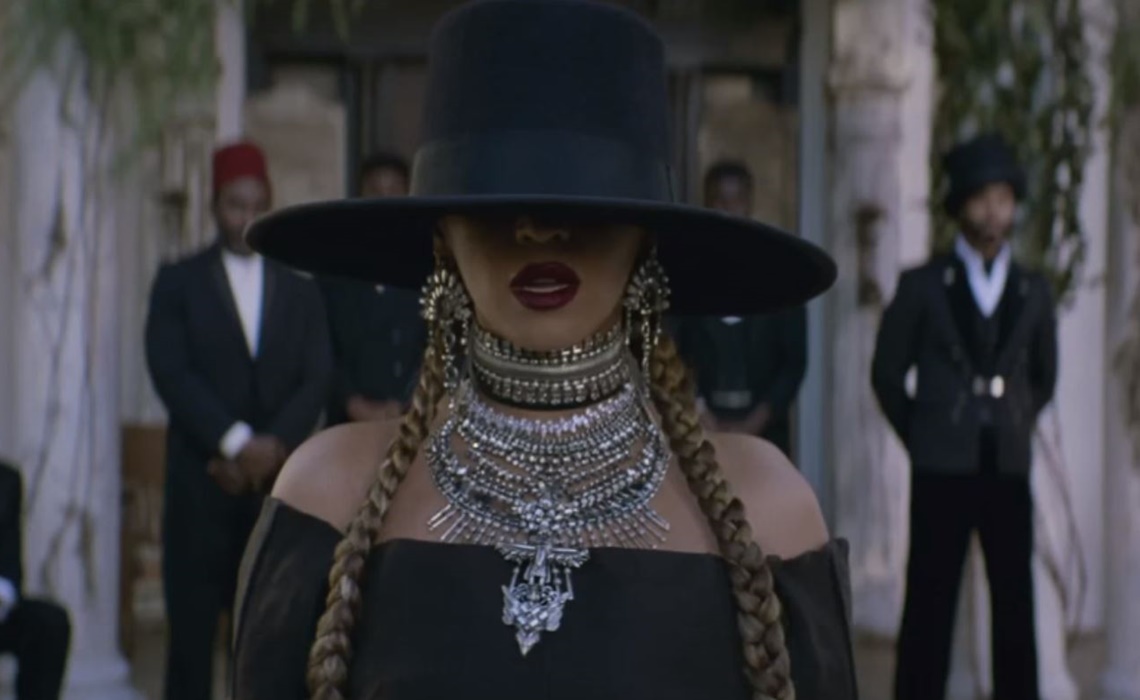“Unfuck the World, You Stupid Girl” – If Grimes is the Villain What Does That Make Us?

An essay about pop music and the climate crisis with Grimes as a case study. “Miss Anthropocene” is out now on 4AD. Written by Macon Holt.
Grimes, Claire Boucher, C, or indeed the eponymous “Miss Anthropocene”, has gone to a lot of trouble to invent alter egos for herself as a part of her creative practice. But reading the swathe of not-mad-but-disappointed reviews of her most recent album, you’d be forgiven for wondering what the point was as so many critics seem more focused on pointing to the perceived gulf between the Grimes they had constructed in their heads over the last decade and the Grimes we actually have. That said, her new record – on which Grimes cast herself as the Goddess of the climate crisis, who encourages us (humanity) to “burn twice as bright for half as long” in a cosmic rave towards entropy – was always going to be met with some antipathy. But, aside from the occasional, and surprising, dressing down on technical grounds, and the equally surprising high, albeit predictably tempered, praise from other publications, the lukewarm reception “Miss Anthropocene” has received in many publications seems curious. In amongst the debatable claims about the overall patchiness of the record and what can only be faux concern about its apparent celebration of villainy, there seems to be a desire for the record and the ideas it contends with to be equivocated out of discursive existence. This is not because the record and its ideas are saturated with transgressive misanthropy, however. Instead, it seems that what is uncomfortable about the villainy of this personification of the climate crisis is that all it needs to destroy us is for the banal horrors of capitalist postmodernity to continue.
I don’t want to get into the weeds of speculation about what personal circumstances have led Grimes to make “Miss Anthropocene”. I have no desire to spend time going over the obvious problematics of the lead practitioner of an ostensibly progressive artistic project being in a relationship with a pseudo-messianic-union-busting-billionaire. These problems are both obvious yet impossible to sufficiently interrogate. Furthermore, similar problematics are inherent to all pop music produced at the level at which Grimes operates. The entanglement of pop music production with not only the reification culture as capitalist commodity but also concrete exploitation is already well known and will not be overcome by a well-argued essay. So if we want to consider her recent work in more specific terms than just another Adornian critique of the culture industry’s mode of production, we need to take that as read.
What I want to do in this essay is to buy all the premises that Grimes has put forth on this record. If Grimes claims this is an album that presents the climate crisis from the perspectives available to its own anthropomorphised malevolence, then I want to go along with this. From there, I want to propose that, with the exception of certain specific points of critique, much of the lukewarm critical reception the record has received has less to do with the record’s music or its execution of the underlying concepts and more to do with how it feels for many critics to be made a part of the object of an artist’s work. Especially when that object is your own impending destruction. In short, I want to try to be less suspicious of the artist’s motives, which I doubt I will ever know or be able to influence, and instead turn my suspicion on to the critical discourse of which I am a part. So the question is if Grimes is the villian what does that make us?
When the UN’s 2018 IPCC report came out with the findings that we have to take urgent and drastic action over the next 12 years if global warming is to be limited to an average of 1.5ºc, there seemed to be two main types of reaction. The first was an obvious mixture of horror, despair and fear. However, the second reaction, which could in subtle ways be combined with the first, seemed to take some solace in the concrete nature of the task before us and the apparent invention of success criteria. (The fact that little has been done to attend to these criteria is, apparently, neither here nor there). It was as if the complexity of global warming and its chaotic secondary and tertiary effects had become a manageable series of goals; a checklist to be worked through. The literary theorist Timothy Morton had previously coined the term “hyperobject” to describe phenomena that, like global warming, are so vastly distributed in space and time that they defied human comprehension. The irony, of course, is that in doing so Morton had provided thousands of art academics with a way to skip over the complexities of environmental disintegration by deploying a simple term that is fun to explain and is often received with nods of approval while clarifying very little. Hyperobjects allowed the climate crisis to be objectified for a certain set of critics and artists. And for others, the IPCC report did the same.
I would like to suggest that despite its sonic fictional tropes, “Miss Anthropocene” does the opposite. Instead of focusing directly on its ostensible topic and trying to encompass everything about it in manageable, affirmative concepts, it looks at the issue somewhat askant. Rather than producing a set of anti-Earth Songs, Grimes has produced a series of affective investigations into the feelings of living in a world that is likely coming to an end. We have the melancholy depths of despair on “Delete Forever”, the gleefully problematic sexualization and romanization of masochism and “violence” on the track of the same name. There are further, uncomfortably close, explorations of suicidal ideation and depressive delirium on “You’ll Miss Me When I’m Not Around”. Then there is the apocalyptic rave of “4ÆM” and the sinofuturist hip-hop track, “Darkseid” – the latter of which features the most explicit expression of the record’s themes. On this track the threats facing us are made all the more haunting by showing just how quotidian they are. “I live with my ignorance / And walk slowly, unconsciously toward death / All my little struggles form a quiet and stable structure like the bubbles / Stay still on the surface of my daily life”. However, because these lyrics are delivered by the, previous Grimes collaborator, Taiwanese rapper, Aristophanes (listed on the record as 潘PAN), in Mandarin Chinese, there is a little distance between these ideas and the comprehension of the average anglophone listener.
The most conceptually interesting moment on the album is perhaps also its most musically subdued, the ballad “New Gods”. The track is only a little faster than a dirge with heavy piano chords that sound like they are collapsing under the weight of the languorous implicit tempo. Within the context of the record, the somewhat cliché lyrics take on a deeper resonance. Lines like, “So I pray, but the world burns / And still you need to come first”, point to obvious ecological themes and the inexorable problems of a world that prizes convenience over sustainability. But where this sentiment could risk slipping into sanctimony and admonition, it instead falls into an interesting kind of despair. The kind of despair that has caused her to reach out for the titular “new gods” in the age of secular (post)modernity. But while these new gods may appear like saviours – and in the moment of desperation, there is not much required of these pseudo-messiahs to maintain this illusion – in actuality, these new gods are the plastic trinkets and fossil fuel-intensive networked images that have been produced by the same means of extractive commodification of planetary resources as the aforementioned petty conveniences. For example, Google may have developed a machine-learning algorithm that can both provide Grimes with experimental synthesizers and make their search engine carbon neutral but it then turns around and sells that algorithm to oil companies to help them find the last of the fossil fuels in the ground so they can put them into the atmosphere.
All of this serves as a set up to the seemingly inevitable complete defeat on “Before the Fever” (a title that has only become more relevant since the album’s release), which declares itself to be “the sound of the end of the world”. The lyrics are a narration of apocalyptic events as they unfold. Grimes’ low vocal register – a stark contrast to the kawaii chirping and ASMR-like whispers that have characterized the performances on most of the tracks so far – illustrates the depletion of human agency in the face of these circumstances. That said, there is something cathartic about this track. As humanity fades out, it seems to open up space for new forms of life to proliferate. “There is hope” as Kafka put it “but not for us”. A point which is underlined by the album’s closer “Idrou”, a track that is so upbeat that it must be happening somewhere else in the universe. Or else it is in the fading consciousness of those last humans still alive as their brains flood themselves with serotonin as they suffocate in the now toxic atmosphere. The lyric “I wanna play a beautiful game / Even though we’re gonna lose”, however, offers up a sober contrast to the prelapsarian joy of the music that surrounds it. Indeed, it would seem to perfectly sum up the bargain many of us are making with our lives at this very moment as we try to imagine a future while the forecasts for it become ever bleaker.

If we take the premise that villainy is at play on these songs, then what kind of evil is this villainy committing? Despite the actions of the character, Miss Anthropocene, in the sonic fiction of the record, it is not that Grimes is making the impending and ongoing collapse of the world’s climatic systems come about. And nor has she induced us to bring about our demise, despite the letter penned by her character. This is not an immediate kind of evil. Instead, it appears to be evil in the sense used by Georges Bataille to describe the capacity of literature to confront readers with the gross inadequacies, omissions, contradictions or hypocrisies of their social order. To return to Kafka, his novels and stories pointed out how the totalizing spread of bureaucratic rationality was ultimately based upon nothing but could destroy one’s humanity all the same. On “Miss Anthropocene”, Grimes is pointing to the disjunction between the actual scale of the crisis before us and the impotence of our bad conscience about it. And indeed the second order impotence of moralizing from such a bad conscience.
In a media and discursive environment that seems to function (by which I mean sustain itself and make a profit) solely by producing moralizing hot takes about, often real, problems, a record that points to the impotence or even unhelpfulness of this way of engaging with the world can only be understood as evil. However, because this evil is not directed at a third party but rather at the very producers of media discourse itself, it doesn’t really serve the maintenance of the status quo to go on an all out attack in response to Grimes as if she were a villain. She has already claimed that ground for herself by creating her alter ego for the album. So instead the move is to diminish the work and make it irrelevant. The upshot of this is ostensibly feminist publications speculating on the influence of her boyfriend on the themes of the record as if Grimes were not capable of noticing the climate crisis on her own. This response was already predicted by Grimes and is articulated in the refrain of the track “My Name is Dark”. Though it is cast as the angel of death talking to God, the venom of the lyric “Unfuck the world, you stupid girl, you stupid girl”, would seem to extend beyond this specific narrative context. It is as if she is actually parodying future critics, who, while they would never say it outright, seem disappointed that her record is about the complex pleasure and pains of living in this moment rather than rallying people to do something about it.
As mentioned in the opening to this piece, it would seem the problem with “Miss Anthropocene” as climate crisis pop is more about the apparent gulf between the Grimes we have and the Grimes many in the world of music journalism have produced in their own imagination. The implicit demand made of Grimes in this lyric from “My Name is Dark” is that she should somehow use the power of her music to save us from the biggest ongoing disaster of our times – as if such a thing were possible – and that the record she actually made was her willfully eschewing her responsibility. As noted by the musicologist, Robin James, such demands are often made of female artists to fulfil a sort of socially accepted position in relation to important issues. James found an example of this in the way Rhianna’s post-Chris Brown record “Unapologetic” was called “post-ethics” by one critic because its overall tone was melancholic rather than defiant. With “Miss Anthropocene” there would seem to have been this implicit expectation that Grimes was to become our heroine to rescue us from our fate, despite her explicitly stating that she was the villain. So “Miss Anthropocene” stifled this expectation. It does so, however, not by working to accelerate our demise but rather by exploring how it is going to feel to go through the awful things that are likely going to happen. And by not pretending that she can prevent it by means of song.
The most galling part of this for some is that she also points to some potential modes of enjoyment that could result from the coming horrors. Galling because by the nature of its causes, those who will get to experience these pleasures are likely those that comprise the pseudo-messianic-union-busting-billionaire class and their hangers-on, which Grimes now is. Indeed a friend recently said to me that he can no longer enjoy Grimes’ music because to him it sounds like the work of a contemporary Silicon Valley Leni Riefenstahl, aestheticizing the plutocracies of the present to pave the way for their thousand-year reign and the disasters that will bring. And in a way I agree. Just as Riefenstahl produced and glorified the visual grammar of the fascism of the Third Reich, Grimes is playing with a certain kind of fascism in her work. Or perhaps more accurately, Grimes is playing with the forms of enjoyment that are only accessible through a certain kind of Silicon Valley fascism. And while this troubles me, I think Grimes may actually provide a certain window into the world of those who can do something to at least mitigate this situation but so far have, effectively, chosen not to.
It is not that Grimes has become the puppet of her pseudo-messianic-union-busting-billionaire, instead, he has inadvertently exposed some of his desires to us through her music. Desires that have spilled over into culture more generally and need to be catalogued and critiqued. Because if we are to intervene in this process of environmental disintegration, we need also to do as Foucault claims we must and track down all the varieties of fascism that constitute our everyday lives. To do so, I think these desires are important to attend to – the superyachts, the gated mansion communities built with oil money, the innovations of sweatshop electronics and the crazy sexual abstractions all this produces. This desire – and its appeal which extends far beyond those who will ever actually be able to actively participate in the form of life it produces – is part of what has brought us to the brink of the end of the world. And those most responsible are starting to worry about that fact. It’s spoiling the fun. These concerns will motivate members of the pseudo-messianic-union-busting-billionaire class in the decades to come and we need to pay attention to how they react. Both in terms of developing political counter strategies but also as a way to examine an infectious form of desire to dominate and extract, to appreciate power, that has helped to bring about the almost end of the world. In short, “Miss Anthropocene” requires a better class of critics, if we are to unravel the specific kind of villainy her music reveals.



